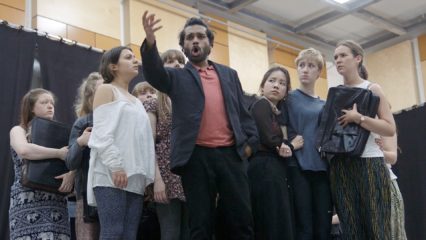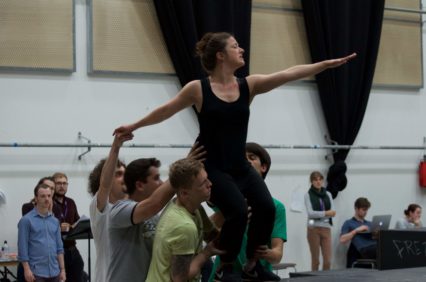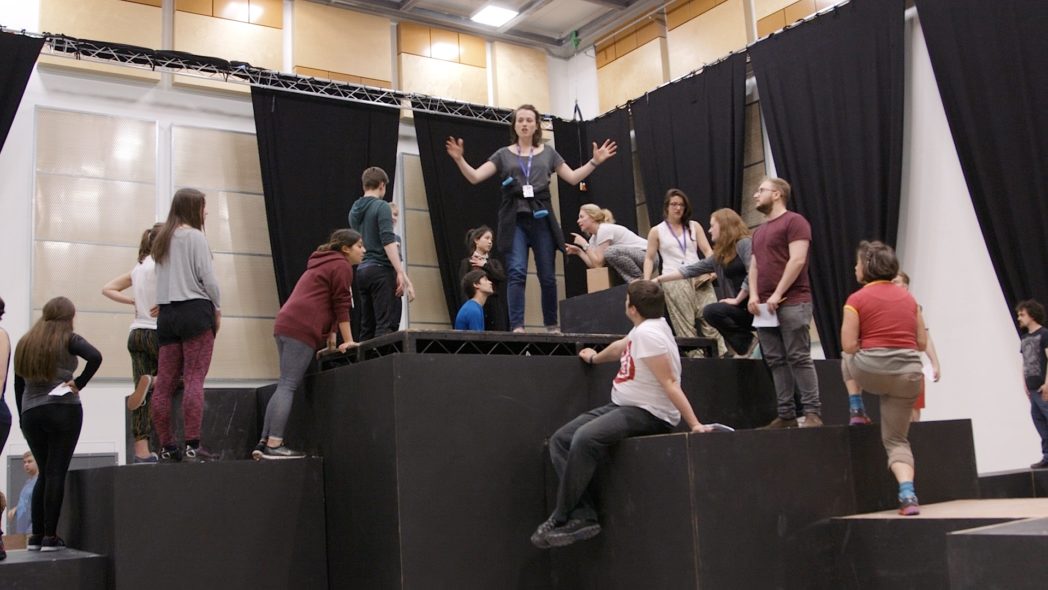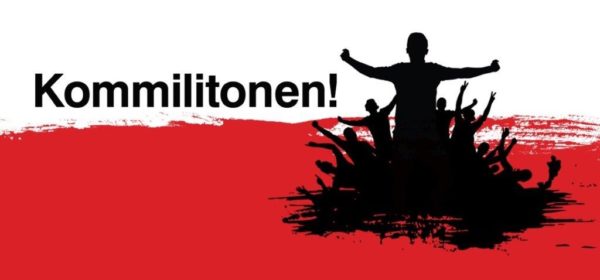Cath Barton attends a rehearsal of WNO Youth Opera’s forthcoming production of Sir Peter Maxwell Davies’ rarely-performed opera, a co-commission by the Royal Academy of Music and Juilliard School in New York, which premiered in London in 2011.*
It’s just a week to go to opening night. The company are in the throes of a technical rehearsal, piecing together the many parts of a complex production in the round. It’s taking place in Barry’s Memo Arts Centre. The orchestra’s seats are set out on the raised stage; the action of the piece takes place in and around staging in the auditorium and the audience will move around the performers.
WNO Youth Opera are preparing a production of Kommilitonen!, an opera by Sir Peter Maxwell Davies to a libretto by David Pountney which is concerned with student revolution. A through-composed series of short scenes interweaves stories of individuals, groups and divided families in three different parts of the world during the twentieth century – Civil Rights Movement America, Nazi Germany and Cultural Revolution China respectively. As the scenes cut between the three scenarios common themes emerge. In this production, audience members will be able to choose where and when they follow the action as it shifts around the space. As Assistant Director Kate Willetts tells me, this promises to be an immersive experience for all involved, one designed to make us all think about what happened then, and also about what is happening in the world now. Like many of those involved, Kate is a recent graduate. She is one of three young assistants to Director Polly Graham and clearly excited to be in the creative team for WNO Youth Opera’s Kommilitonen!

The title of the opera comes from the leaflets distributed by Die Weisse Rose resistance group in Germany in 1942-43, addressed to ‘Fellow Students!’ While that is a literal translation of the word ‘Kommilitonen’, the translation used by WNO is Young Blood. This both embraces the other stories of young revolutionaries woven into the opera, and conveys the spirit of youthful energy which I found in abundance in the rehearsal room.
When I arrive at the beginning of the day, Movement Director Jo Fong is working with the two groups of three young people to finesse the movement in a scene from the strand of the opera which tells stories from China’s Cultural Revolution at the time of Chairman Mao. “Quickly, quickly,” she urges them as the first group pass their fat suits over the second, “Let’s enjoy each other’s sweat!” Soon after, she’s told she has just four minutes left to work on the scene before the whole cast is called together for a vocal warm-up. There’s no sense of rush or panic in the room, though, just people getting on with the job.
During the lunch break I chat with Katie Phillips, at 16 the youngest member of the cast and one of those playing a “jazzy general” wearing a fat suit in the scene which I saw being rehearsed earlier. She’s just finished her GCSEs and is going on to study for ‘A’ levels and apply to music colleges. She heard about the show through Facebook and tells me she’s having a really good time and is loving the freedom and energy of the work, though musically it’s been challenging.

I hear those words “freedom”, “energy” and “challenge” repeated more than once during the day. Director Polly Graham was under no illusion about how ambitious a piece she had chosen for this WNO Youth Opera production, but she embraced the challenge for herself and the whole company because the work is, she says, “so original, so little-known and so well-written”, and she likes “the excitement of the very big hill to climb”. She thrives on the enthusiasm of the young people involved and their commitment to the process. Jo Fong similarly told me of how the performers had risen to the physical demands of the show, proving to themselves that they could do more than many of them had thought possible.
Chatting with other members of the cast, I hear from them how inspired they are by the lead given by Polly and Jo. Chiara Vinci, who plays Sophie Scholl from Die Weisse Rose in two performances (most of the roles are doubled), speaks of Polly as being “the mothership”, “super-factual” and having a clear vision. Originally trained as a dancer and now studying singing in London, Chiara has not come through the conventional music college route. Similarly Oscar Castellino, from Mumbai, only started singing seriously at the age of 23 when he got involved in Giving Voice to India, an initiative by the singer Patricia Rozario.
Both Chiara and Oscar, who plays James Meredith, the first African-American to attend the University of Mississippi, have found learning the music demanding, but rewarding too. Oscar remarks on how particular Alice Farnham, the Music Director and Conductor, has been about text and the importance of conveying it clearly, especially as they are working in an acoustic which can easily swallow words. Everyone I talk to mentions how much they have been moved by the stories they are telling. Harin Oh, who plays Wu, a daughter in the Cultural Revolution part of the narrative, says: “Knowing this really happened is powerful – it moves people’s hearts.” Katie Phillips speaks of finding it “overwhelming” that people went through these experiences, and that some younger than her, even children as young as eight and nine, were recruited as Red Guards.

It is apparent from my conversations that members of the cast have a personal investment in this production that goes way beyond it being an enjoyable experience for them as singers. Polly Graham speaks of the “huge amount of ownership” which springs from all the brainstorming and discussions that the whole cast and creative team have had during the rehearsal process. I ask the young people about student activism now. Katie Phillips says that she feels protest is more peaceful now; Chiara Vinci tells me she had never considered herself a very political person but that working on this show has made think about the little things that she can do for others, kind deeds. Not that they are naïve. Others nod when Harin Oh says that the issues covered in the show are not just of the past. She says Chinese families are still impacted by the Cultural Revolution now. And elsewhere racism persists, people are not free to live equal lives. That’s why looking back on issues as Kommilitonen! does, enacting and reflecting on them, is important as Polly Graham says.
The team are working in a place that was built as a memorial to the people of the town who gave their lives in the pursuit of freedom in 1914-18. It’s writ large in the foyer: “They died that freedom might not perish”. That’s one thing that sold the place to Polly and the Production Designer Gabriella Slade when they were looking for a venue. That and the fact that WNO have never taken a show to Barry before, something about which Polly clearly feels strongly.
When I leave at 4.30, the cast have another hour and a half’s work to do. The technical team will probably be there even longer into the evening. A rehearsal room for a production this big, with a cast of 40 and many more in the creative team, can look chaotic to someone visiting. What comes to my mind is a colony of ants scurrying about. At first their movement makes no sense, but as you watch over a period of time you realise just how highly-organised they are. The same is true here. Scenes are run, movement tweaked, re-run. Lighting is adjusted, the progression of video projections fine-tuned. The parts are moving together to form the whole which will only be complete on opening night when the audience enters the room, the orchestra tunes up and Conductor Alice Farnham and singer Oscar Castellino step into the light for the first notes of the opera.
* Max was one of the UK’s most distinguished composers. He died earlier this year, in March, and you can read WNO Artistic Director David Pountney’s response here. Composer Peter Reynolds wrote this personal tribute for Wales Arts Review (Music Ed.)
Kommilitonen! opens at the Memo Arts Centre, Gladstone Road, Barry on 27th July and runs until 30th July.
Header image and rehearsal photos courtesy of Welsh National Opera.



 Enjoyed this article? Support our writers directly by buying them a coffee and clicking this link.
Enjoyed this article? Support our writers directly by buying them a coffee and clicking this link.








